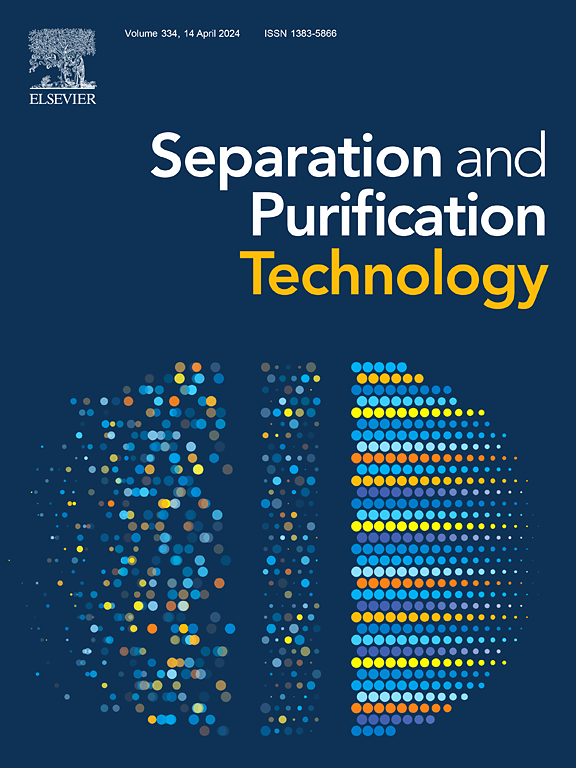Harnessing fluoride-induced hydration dynamics for ultra-selective bioalcohol separation
IF 8.1
1区 工程技术
Q1 ENGINEERING, CHEMICAL
引用次数: 0
Abstract
A salt-induced biphasic separation strategy utilizing potassium fluoride (KF) was developed for the efficient, green, and cost-effective recovery of biobutanol and bioethanol from concentrated acetone/n-butanol/ethanol (ABE) fermentation broth. Liquid–liquid equilibrium data demonstrated KF’s exceptional salting-out performance: at 500 g/kg addition, it achieved 99.17 % dehydration, 91.95 % ethanol recovery, and complete n-butanol recovery, outperforming other potassium halides and highly soluble strong base–weak acid salts. Across various test systems, such as 40 wt% ABE, 50 wt% ABE, 40 wt% acetone, 40 wt% n-butanol, 40 wt% ethanol, 12 wt% acetone, 24 wt% butanol, near-saturation KF levels consistently yielded > 98 % dehydration, >91 % ethanol recovery, and >99.8 % butanol recovery, confirming its superior adaptability and stability. Mechanistic insights revealed that KF disrupts water-organic azeotropes via F−-driven hydrolysis and intense hydration interactions, where its charge density and hydration enthalpy promote selective water binding and phase separation. Additionally, synergistic interactions between KF and both polar and non-polar ABE components were identified as key to enhanced separation. This study provides a robust theoretical and practical framework for next-generation salting out in biofuel purification.
利用氟化物诱导水合动力学进行超选择性生物醇分离
为了从浓缩丙酮/正丁醇/乙醇(ABE)发酵液中高效、绿色、经济地回收生物丁醇和生物乙醇,研究了氟化钾(KF)盐诱导双相分离策略。液液平衡数据证明了KF优异的盐析性能:添加量为500 g/kg时,脱水率为99.17% %,乙醇回收率为91.95% %,正丁醇完全回收,优于其他卤化钾盐和高可溶性强碱弱酸盐。跨不同的测试系统,比如40 wt %安倍,50 wt %安倍,40 wt %丙酮,40 wt %正丁醇,40 wt %乙醇,12 wt %丙酮,24 wt %丁醇,接近饱和KF水平持续产生 祝辞 98 %脱水,在91 %乙醇复苏,并在99.8 %丁醇复苏,确认其优越的适应性和稳定性。机理分析表明,KF通过F−驱动的水解和强烈的水化相互作用破坏了水-有机共沸物,其中其电荷密度和水化焓促进了选择性的水结合和相分离。此外,KF与极性和非极性ABE组分之间的协同相互作用被认为是增强分离的关键。本研究为新一代生物燃料脱盐提纯提供了坚实的理论和实践框架。
本文章由计算机程序翻译,如有差异,请以英文原文为准。
求助全文
约1分钟内获得全文
求助全文
来源期刊

Separation and Purification Technology
工程技术-工程:化工
CiteScore
14.00
自引率
12.80%
发文量
2347
审稿时长
43 days
期刊介绍:
Separation and Purification Technology is a premier journal committed to sharing innovative methods for separation and purification in chemical and environmental engineering, encompassing both homogeneous solutions and heterogeneous mixtures. Our scope includes the separation and/or purification of liquids, vapors, and gases, as well as carbon capture and separation techniques. However, it's important to note that methods solely intended for analytical purposes are not within the scope of the journal. Additionally, disciplines such as soil science, polymer science, and metallurgy fall outside the purview of Separation and Purification Technology. Join us in advancing the field of separation and purification methods for sustainable solutions in chemical and environmental engineering.
 求助内容:
求助内容: 应助结果提醒方式:
应助结果提醒方式:


